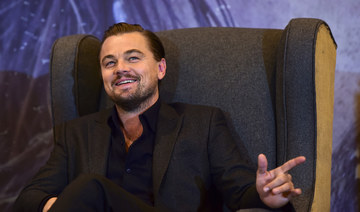DUBAI: Last weekend, users took to social media to call out big brands that continued to operate in Russia after its invasion of Ukraine, causing hashtags such as #BoycottCocaCola and #BoycottPepsi, among others, to trend on Twitter.
Within a few days, both of the soda giants, along with McDonald’s, Starbucks and others, had announced the suspension of their businesses in Russia.
This is not the first time that consumers have called out brands over their actions, or lack of action. Last year, ice cream maker Ben and Jerry’s announced it would stop selling its products in the Occupied Palestinian Territory. In an opinion piece for The New York Times, founders Bennett Cohen and Jerry Greenfield said they are “proud Jews” and that “it’s possible to support Israel and oppose some of its policies.”
The decision prompted both praise and hate online, with some consumers accusing the business of antisemitism — either way, Ben and Jerry’s was very much in the public eye.
“Ben and Jerry’s has a very long history of political positioning and commitment to a variety of progressive causes,” Robert Haigh, strategy and insights director at Brand Finance, told Arab News. He added that Unilever acquired the company in 2000 and so the dynamic might eventually change.
“For the sake of continuity of the Ben and Jerry’s brand, they continue to be relatively outspoken and committed to (causes), whereas Unilever is a bit more measured in what they seek to do,” which raises questions about brand’s independence and authenticity, he said.
Authenticity is paramount for brands in their conversations with customers and in the causes they choose to support, and how politically active an organization should be is a “very contentious subject,” according to Seth Hand, the managing director of communications marketing firm Edelman Middle East.
“However, one thing to keep in mind is that your actions need to be authentic to who you are as an organization and in line with your values,” he added.
This sentiment was echoed by Alisa D’Souza, founder and PR consultant of Alisa PR.
“Brands need to establish their core values; they need to know who they are, define their identity, be strong in their core values and know what their company stands for,” she said.
Consumers increasingly expect brands to join in the conversation and stand for something. According to a study carried out by Edelman in 2021, for which researchers surveyed consumers from 14 countries, including the UAE and Saudi Arabia, 86 percent of people said that they expect brands to take actions that go beyond their product lines and business.
On Twitter, almost half (48 percent) of those surveyed agreed that it is “more important now for brands to support economic, social, political or cultural issues, even when the issue doesn’t directly impact them, (than it was) a year ago.”
For the brands, it really comes down to a question of ethics and morality versus profit, even though the perceived morality of a business is increasingly linked to its profits.
There are some who argue that the sole priority of a business is to serve the interests of its owners or shareholders, said Haigh.
“Other people often say, and I think this is increasingly prevalent, that businesses have a broader set of stakeholders that they do, and should, cater to,” he added.
Hand pointed out that in the past, many organizations prioritized profit over purpose.
“Even today, not every organization views purpose as a key business priority,” he added: “However, the digital world has changed the paradigm of communications, and consumers now have significant power to hold organizations to account and expect them to use their power and influence to advocate for positive change in society.”
Many consumers, and employees, want brands to play a larger role in addressing issues such as climate change, economic inequality, workforce reskilling and racial injustice. Nearly 60 percent of consumers choose brands based on their values and beliefs, according to the 2022 Edelman Trust Barometer.
However, Haigh cautioned brands to be wary of embarking on “mission-driven brand building.”
“No one relishes this but there are limits on the extent to which you can build your brand on that basis,” he said. “As beneficial as it can be, there is a limit to how much the average consumer cares.”
Consumers might express outrage on social media about the actions of a brand, or lack thereof, but does this necessarily mean that they will actually stop buying its products in protest?
“What people do online and offline can differ dramatically,” said Alex Malouf, a communications professional and board member of the Public Relations and Communications Association MENA.
“They may tweet a negative take on a brand but they often don’t follow through.”
For the brands themselves, the decision to publicly align with a cause — political or otherwise — can result in a backlash.
In 2019, Procter and Gamble’s male-grooming brand Gillette updated its 30-year old advertising slogan from “The Best A Man Can Get” to “The Best Men Can Be” in an effort to address the issue of toxic masculinity. The change sparked fury from some online, with several commentators calling for the company to post an apology and threatening a boycott.
Nike faced a similar situation as a result of an advertising campaign featuring former NFL quarterback Colin Kaepernick, whose decision to take a knee during the playing of the national anthem before games as a protest against racism and police brutality was a polarizing issue in US society.
“Nike made a very overt domestic political statement by aligning themselves to him,” said Haigh.
The campaign generated a lot of controversy, including some people who filmed themselves burning their Nike shoes and posted the videos on social media.
On the other hand, said Haigh, “there is a very large constituency of people for whom the Nike brand was re-energized” as it aligned itself with a younger, more progressive audience.
In 2015, UAE-based telecoms company Etisalat came under fire for its star-studded #EtisalatChallenge campaign. The premise was simple enough: It challenged users to find a better price than Etisalat offered, and promised to match or better it.

What could possibly be the problem with that? Well, for one thing there are only two telecoms companies in the UAE, Etisalat and du, both of which are partly government-owned.
Etisalat’s campaign hashtag was swiftly hijacked by social-media audiences who instead used it to complain about the brand and “challenge” it to fix issues and problems customers were experiencing.
“Despite the obvious backfiring of the campaign, Etisalat has persevered with the #EtisalatChallenge,” Malouf wrote on his blog at the time.
“In today’s unpredictable world, reputations can be made — or lost — in a heartbeat,” according to Hand.
Although brands should invest in crisis communications planning, this should be part of a broader reputation-building strategy, he said.
“Organizations that truly value their reputations proactively work to create trust with their stakeholders, embody strong values, communicate transparently and address key societal issues,” he added.


























